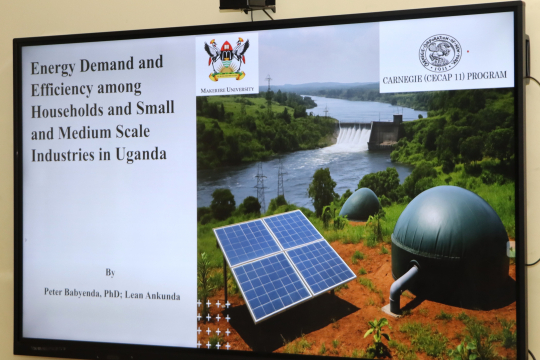EfD Uganda (EfD-Mak) at Makerere University has launched a two-year research project aimed at improving energy efficiency among households and small and medium enterprises (SMEs) in Uganda. The project is funded by a $30,000 grant from the Carnegie Corporation under the CECAP II program and officially commenced with an inception workshop at EfD-Mak.
EfD researcher Dr. Peter Babyenda leads the study, which seeks to identify key drivers of energy consumption, whether charcoal, LPG, or electricity, and explore how they can be made more efficient, particularly in the manufacturing sector. The research falls under the broader umbrella of Makerere University’s Directorate of Research and Graduate Training, overseen by Principal Investigator Prof. Buyinza Mukadasi and guided locally by Professor Edward Bbaale, Director of EfD-Mak.
This directorate is supported by the Carnegie Corporation of New York under a program titled: Consolidating Early-Career Program at Makerere and other public universities (CECAP II)
Uganda’s rising electricity costs and growing population necessitate a shift toward greater energy efficiency.
“The only sustainable way to address rising energy costs is through improved efficiency,” emphasized Peter Babyenda.
The inception workshop drew participants from the Ministry of Energy and Mineral Development, engineers, economists, and researchers from institutions like the Economic Policy Research Centre. Their input will help refine data collection tools and methodologies. The research team plans to revise their instruments and submit them to the CoBAMS Research Ethics Committee for approval, with fieldwork expected to begin in June 2025.
Selected from a competitive pool of proposals, the project aims to produce two peer-reviewed academic publications and a comprehensive report. Findings will be disseminated to both policymakers and end users, including ministries and community stakeholders.
“This project is a milestone for us at EfD-Mak. We are excited to contribute research that has the potential to influence national energy policy,” said Peter Babyenda.
Dean calls for stakeholder engagement and practical insight
Mike Ibrahim, Dean of the School of Economics at Makerere University, praised the project for its academic quality and relevance. He emphasized that research should reflect real-world needs, which is why inception workshops are vital in testing whether research concepts align with stakeholder priorities.
He encouraged the research team to engage deeply with technical experts, especially engineers, to understand how energy systems function in practice.
“Efficiency is not just an economic concept—it’s grounded in how energy systems work, and that’s an engineering issue,” he said.
Mike Ibrahim also advised the team to refine their conceptual framework based on stakeholder input and shared that one of his successful policy papers stemmed from such a workshop. Furthermore, he stressed the importance of inclusive dissemination strategies. “For any research to have real impact, it must involve the end users, not just at the point of output but from inception through to delivery,” he said..
Participants seek energy awareness and policy integration
Government and academic stakeholders echoed the importance of increased energy literacy and integrated policy frameworks.
Esther Fiona Atek, Energy Officer at the Ministry of Energy and Mineral Development, expressed interest in the study’s ability to provide detailed energy consumption data. She highlighted the ministry’s need for disaggregated information by region and energy use type (for instance, cooking vs. lighting), especially for rural and urban households.
She believes the research will help the ministry promote appropriate energy-efficient technologies and guide targeted interventions.
“The research will inform future policies to promote energy-efficient technologies both in households and SMEs,” she said.
Dr. Abubaker Matovu Wasswa, Head of the Department of Electrical and Computer Engineering at Makerere University, emphasized the need for broader public education on energy types and their uses. He noted that many Ugandans still limit solar power to lighting, unaware of its wider applications.
He warned that without proper user education, Uganda risks wasting valuable energy resources. “If we don’t educate users on energy efficiency across all forms, we risk wasting valuable resources and missing out on long-term sustainability,” he said.
With fieldwork scheduled for June 2025, the EfD-led project aims to produce practical recommendations to guide national policy and improve energy use in homes and manufacturing sectors alike.
By Jane Anyango
Communication Officer




